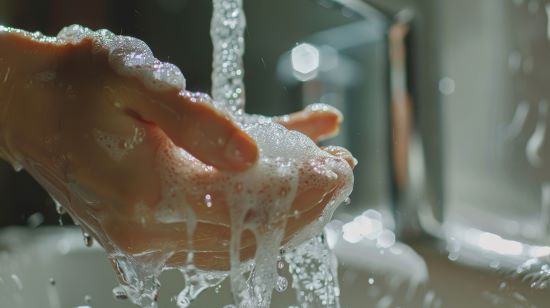When the COVID-19 pandemic caused enormous disruptions to our daily lives, we adopted new hygiene habits. We started wearing masks in public spaces. We socialized less. We cocooned, stayed home, and stopped going out to restaurants to eat.
In our household, because I likely was infected by COVID-19 at a supermarket before vaccines were available, we decided to use third-party shoppers to purchase groceries for us.
There was a run on Hepa air filtration systems being installed in offices and homes.
All of this extra hygiene vigilance produced public health results. Rhinovirus infections, the cause of the common cold, went way down. Influenza outbreaks lessened.
The children born and growing up during the pandemic were spared exposure to childhood diseases like chicken pox, measles, mumps, whooping cough and more, some caused by viruses and others by bacteria.
We Are More Than The Sum Of Our Human Cells
Viruses and bacteria are very different in how they impact the human body. You may not be aware that our bodies contain more bacterial cells than the total number of human cells. These bacteria have been with us through our species’ evolution.
Never confuse viruses with bacteria. Most viruses are not welcome in us. They seldom produce positive benefits. The only good viruses are the ones we modify to deliver vaccines and medications.
As for bacteria, they can be good and bad. The bad ones include salmonella, E. coli, Campylobacter, Listeria and Clostridium Perfringens to name a few. We seldom talk about the good ones which are classified as commensals and symbionts. These bacteria have co-existed with us for a long time and contribute to our normal healthy body functions. Those who study human bacteria describe our bodies as walking, talking sacks containing a biome of healthy bacteria. These, along with our immune systems, protect us from viruses, bad bacteria, and other hostile invaders.
The Hygiene Hypothesis Revealed
The COVID-19 pandemic led to the lifestyle changes described above. This created an absence of exposure to COVID-19, other viruses and microorganisms. The lack of exposure has reinforced a theory first proposed in 1989 by an immunologist, David P. Strachan who argued that early childhood exposure to viruses and microbes that make us sick ultimately strengthens our immune systems and protects us from developing allergies and autoimmune diseases.
The hygiene hypothesis says a little bit of dirt exposure is a good thing. Several living examples support the hypothesis. These include:
- Studies that show children born by Caesarian section are more susceptible to bacterial infections than those that go through normal birth canal delivery. The reason is that a Caesarian child doesn’t benefit from exposure to the mother’s bacterial biome resident in the birth canal.
- Studies make the same argument for breastfed versus bottle-fed children. The former is said to be advantaged through exposure to a mother’s bacteria in the milk.
- Studies also argue that people living with pets or people exposed to farm animals benefit from exposure to alien biomes producing positive autoimmune benefits.
Strachan’s hypothesis came from his observations of 17,414 British children over 23 years looking at perinatal, environmental and social factors influencing those who got hay fever, a seasonal allergy.
Strachan theorized that reduced exposure to infections impacts gut flora in children and leads to higher risks for abnormal allergic and immune system tolerance. He equated the improvements in Britain in sanitation and hygiene with a growing trend of weaker immune systems in children. The theory caught on rapidly with anti-vaxxers proposing to disband vaccination programs for children.
The Hygiene Hypothesis Questioned
Is the hygiene hypothesis correct? I discovered 11 unanswered issues that question Strachan’s observations. These include:
- There is a lack of clear evidence to link improved hygiene to childhood allergies including a lack of specificity regarding which of the bacteria in our gut biome protect us from allergic and autoimmune diseases.
- There is an oversimplification of how the immune system develops and works.
- The hypothesis has led to public confusion about personal hygiene practices instilled in us since childhood. Should we be questioning the desire to keep our environment clean if that means it could be making us sicker?
- The hypothesis has stirred up a segment of the population to question medical science and practice today with fewer parents paying attention to inoculating children against common childhood illnesses.
- The hypothesis doesn’t consider epigenetic responses to environmental factors contributing to increases in allergies and weakened autoimmune responses.
- The hypothesis doesn’t look at genetic factors that make children predisposed to allergies and autoimmune diseases.
- The hypothesis doesn’t consider our living environments today versus the past. More of us live in cities than in rural settings. Having become citified have we lost exposure to co-evolved microbes that were with us when we lived in rural settings and small towns?
- What roles does lifestyle play in allergic and autoimmune responses? This is certainly more than just washing our hands and an internal plumbing sanitation issue. Does being physically more active versus sedentary alter our gut microbiome?
- What role does diet play in allergic and autoimmune responses? Does our increased eating of processed foods and fat and the decline in fibre intake shape our gut microbiome?
- The hypothesis doesn’t consider the role Vitamin D deficiency can play through reduced sun exposure and a lack of it in the diet.
- What role do viruses play in triggering allergic and autoimmune responses?
For further reading on this fascinating subject, I suggest you look at Jean-François Bach’s article that appeared in Frontiers in Immunology in 2021 entitled, “Revisiting the Hygiene Hypothesis in the Context of Autoimmunity.”









